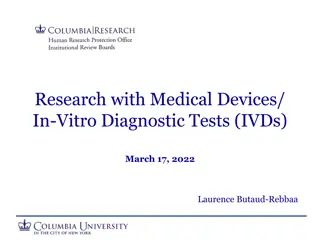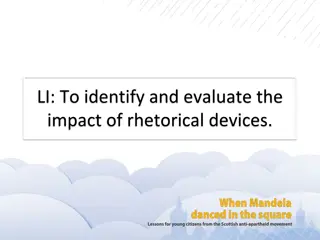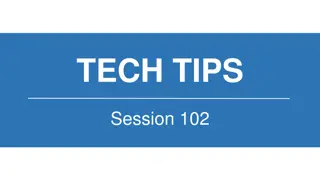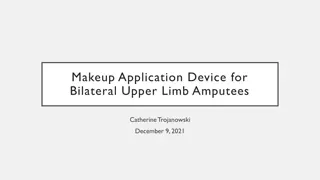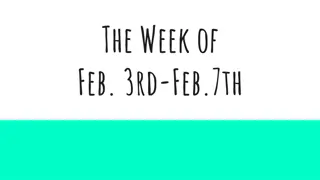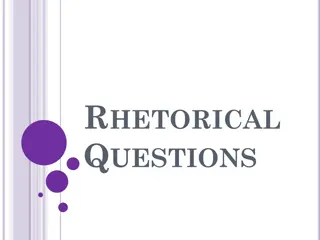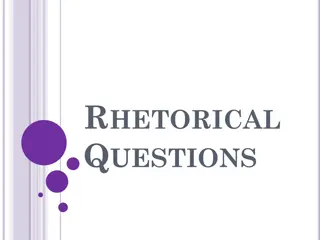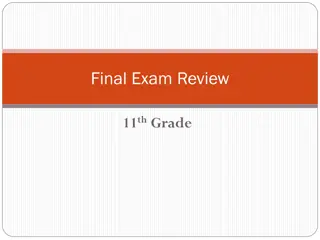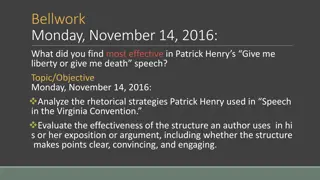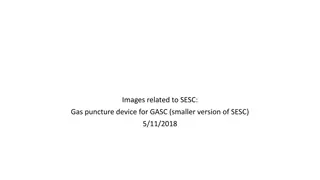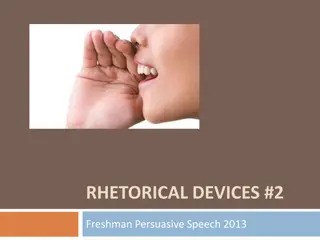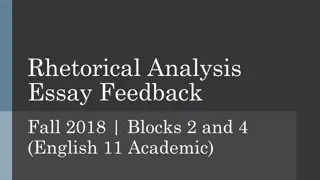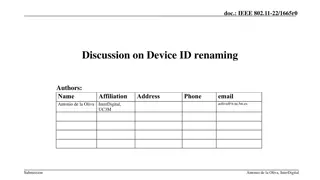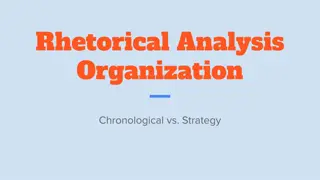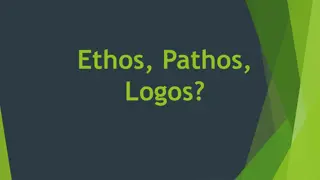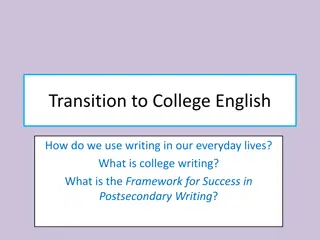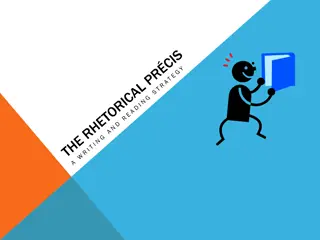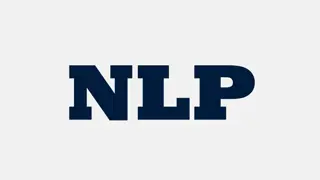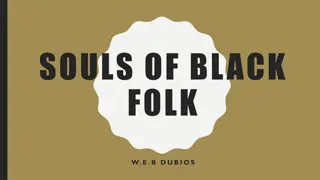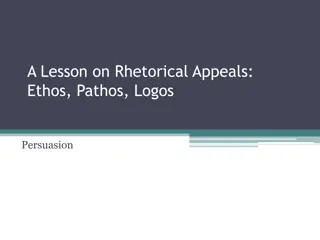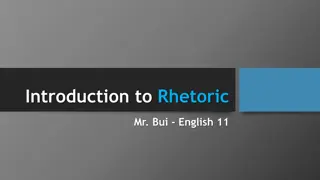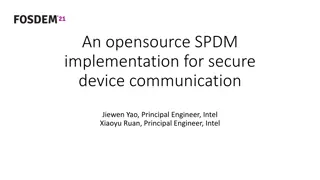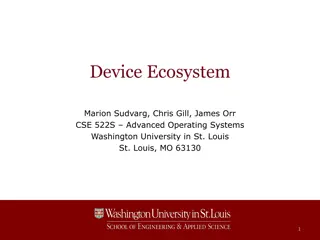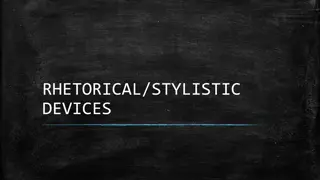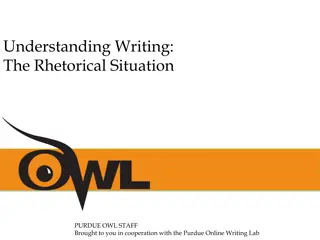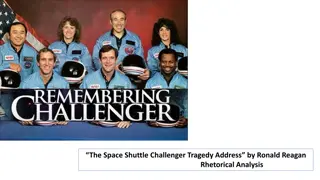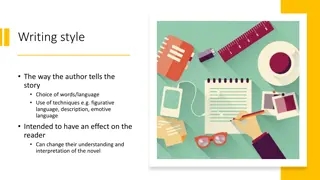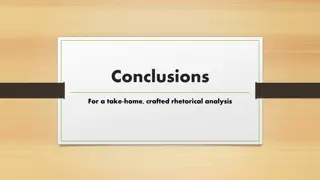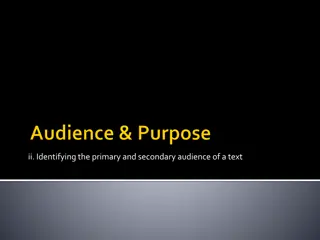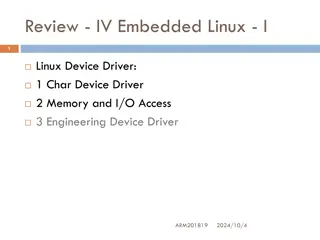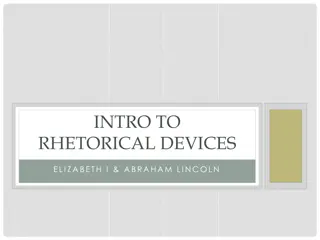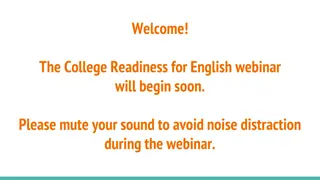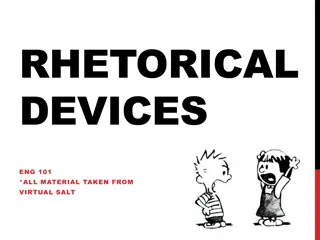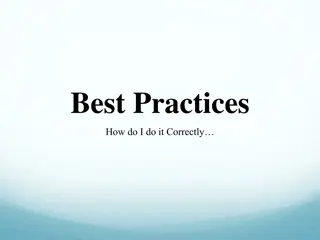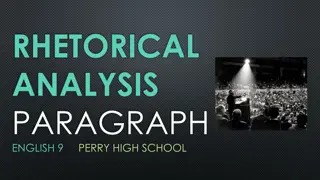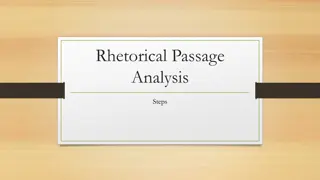Understanding FDA Regulations and Medical Device Classification
The Food and Drug Administration (FDA) plays a crucial role in regulating research, manufacturing, marketing, and distribution of medical devices. Medical devices are classified based on risk and intended use, with three main categories determining regulatory pathways. The classification system help
2 views • 27 slides
Impact of Rhetorical Devices in Speeches by Malala Yousafzai, Martin Luther King Jr., and Greta Thunberg
The speeches by Malala Yousafzai, Martin Luther King Jr., and Greta Thunberg exemplify the power of rhetorical devices such as rhetorical questions, repetition, emotive language, and direct address. These devices effectively convey their messages and evoke strong emotions, highlighting the importanc
0 views • 11 slides
Unlocking Your Device's Full Potential: A Comprehensive Guide
Embark on a journey to master your device with insights on device features, app tours, camera and photos, workplace rules, and what comes next. Learn how to manage notifications effectively, make the most out of telephone features, save contacts efficiently, navigate quick settings for WiFi, Bluetoo
0 views • 23 slides
Innovative Makeup Application Device for Bilateral Upper Limb Amputees
Proposed solution entails a makeup application device designed for bilateral upper limb amputees, enabling independent makeup application. The device incorporates three components: an intermediary device, makeup brush end-effectors, and a change-out station/makeup case. Addressing the need for empow
0 views • 22 slides
Analyzing Rhetorical Devices in Super Bowl Ads
Explore the use of rhetorical devices such as rhetorical questions, emotive language, parallel structures, and more in the context of Super Bowl advertisements. Students will learn to identify and analyze these devices to understand their impact on the effectiveness of advertising messages.
0 views • 42 slides
Understanding Rhetorical Questions and Their Purpose
Rhetorical questions are used in communication to persuade or influence others without expecting an answer. They can be seen in debates, where the goal is to change people's minds. This content explains the meaning of rhetorical questions, why they are used, how to identify them, and provides exampl
0 views • 12 slides
Understanding Rhetorical Questions: Meaning, Usage, and Examples
Rhetorical questions are used to persuade and influence people by posing inquiries that do not require actual answers. By delving into the meaning, purpose, and identification of rhetorical questions, this comprehensive guide sheds light on how these questions play a crucial role in communication an
1 views • 17 slides
Literary and Rhetorical Terms Explained: A Visual Guide
Dive into the world of figurative language with this comprehensive visual review of literary and rhetorical terms. Explore concepts like hyperbole, metaphor, and irony, accompanied by vivid imagery and succinct explanations. Enhance your understanding of literary devices and their usage in writing a
0 views • 75 slides
Analyzing Rhetorical Strategies in Patrick Henry's Speech
Explore the effective rhetorical strategies used by Patrick Henry in his influential speech "Give me liberty or give me death" delivered at the Virginia Convention. Dive into the structure and persuasive elements of the speech to understand its impact on the audience and its historical significance.
0 views • 16 slides
Analysis of Rhetorical Moves in Islamic Studies Research Abstracts
Investigating rhetorical moves and linguistic realization in research article abstracts in Islamic studies reveals the prevalence of specific moves such as Purpose and Results, while Conclusion is least common. Different articles apply varying numbers of moves based on Hyland's framework.
0 views • 9 slides
SESC Gas Puncture Device for GASC - Images Collection
Collection of images showcasing a gas puncture device used for GASC, including assembly, puncture tip close-ups, and operational demonstration. Images highlight the device's components and usage, from sealing protection to sample collection. The series illustrates the process and components involved
0 views • 4 slides
Mastering Rhetorical Devices for Persuasive Speech - Tips & Examples
Unveil the power of rhetorical devices in persuasive speech through parallelism, rhetorical questions, analogies, personification, and allusions. Understand how to captivate your audience and convey your message effectively using these tools.
1 views • 11 slides
Rhetorical Analysis Essay Feedback for Improved Writing
Detailed feedback on rhetorical analysis essays for English 11 Academic students in Fall 2018, focusing on introduction, topic sentences, evidence, analysis, clinch, and conclusion to enhance writing skills. Emphasis on content, style, avoiding clichés, and maintaining analysis in present tense.
0 views • 33 slides
Discussion on Device ID Renaming in IEEE 802.11-22/1665r0
The document explores the ongoing discussion on renaming the Device ID in IEEE 802.11-22/1665r0 standards. Various proposals, including Persistent Opaque Identifier and Persistent Identifier, are considered. The Device ID's role in the current specifications is analyzed, along with the opacity of th
0 views • 10 slides
Analyzing Chief Seattle's Rhetorical Strategies
Explore the organizational strategies of chronological and strategic approaches in a rhetorical analysis of Chief Seattle's speech. Learn how to chunk the text and identify key rhetorical devices used by the author to convey a powerful message about nature and respect for the land.
0 views • 11 slides
Historic Speech Excerpts Reflecting Rhetorical Techniques
Excerpts from speeches by Martin Luther King Jr., Barack Obama, and Ben Bernanke showcase the use of ethos, pathos, and logos in persuasive communication. Each speaker employs different rhetorical strategies to convey their messages effectively. King's emotive appeal, Obama's strategy of outlining s
0 views • 13 slides
Understanding Rhetoric in College Writing
Exploring the significance of rhetoric in college writing, this content highlights the essence of situated communication, rhetorical situations, and the use of various devices in analyzing texts such as political speeches and hip-hop culture. It emphasizes the importance of understanding author purp
0 views • 11 slides
Understanding Rhetorical Précis Writing
A rhetorical précis is a structured four-sentence paragraph that addresses the rhetorical situation of a discourse, capturing essential elements such as the author's name, title, publication date, major assertion, purpose, and audience relationship. The first sentence introduces the author and thes
0 views • 10 slides
Analyzing Discourse Structures in Natural Language Processing
This content explores various aspects of NLP including discourse analysis, parsing, rhetorical relations, and argumentative zoning. It delves into understanding text structures, relationships, and the use of different rhetorical devices. Examples and illustrations are provided to aid comprehension a
0 views • 8 slides
Mastering Rhetorical Devices and Delivery Techniques for Effective Speeches
Explore the art of utilizing rhetorical devices such as aphorisms, allusions, analogies, and juxtaposition to enhance your speech delivery. Understand the significance of body language in communication and learn how to adapt it based on your audience, topic, and message. Discover the impact of varyi
0 views • 14 slides
Analysis of Du Bois' Use of Prejudice and Rhetorical Devices in 'Souls of Black Folk'
In W.E.B. Du Bois' "Souls of Black Folk," he explores the concept of prejudice and its impact on the African American community. Du Bois contrasts white Americans' perspective on prejudice as a defense of culture with the reality of how it humiliates and undermines African Americans. Through powerfu
0 views • 9 slides
Understanding Rhetorical Appeals: Ethos, Pathos, Logos
Delve into the art of persuasive communication through the exploration of ethos, pathos, and logos appeals. Discover how these rhetorical tools are utilized to sway audiences' emotions, logic, and credibility. Gain insights on how to analyze and decipher persuasive techniques employed by writers, sp
0 views • 26 slides
Unveiling the Art of Rhetoric: A Comprehensive Guide for English 11 Students
Delve into the world of rhetoric with Mr. Bui as your guide in English 11. Explore the definition, background, and significance of rhetoric, along with key concepts such as SOAPStone, the Rhetorical Triangle, and the Rhetorical Appeals (Ethos, Logos, Pathos). Learn how Aristotle laid the foundation
0 views • 24 slides
An Open-Source SPDM Implementation for Secure Device Communication
This article introduces an open-source SPDM (Secure Protocol and Data Model) implementation for secure device communication, developed by Jiewen Yao and Xiaoyu Ruan, Principal Engineers at Intel. SPDM aims to enhance device security through protocols for device authentication, session key establishm
0 views • 29 slides
Evolution of Device Ecosystems and Connectivity Technologies
Device ecosystems are reshaping user interactions and experiences, introducing new technologies like device communication, virtualization, and cloud infrastructure. The history of Unix derivatives, iOS development, and connectivity modes such as Ethernet, WiFi, Bluetooth, NFC, and USB are highlighte
0 views • 14 slides
Exploring Rhetorical and Stylistic Devices in Speeches
Delve into the world of rhetorical and stylistic devices used in speeches, such as repetition, imagery, and devices of comparison like simile, metaphor, analogy, and juxtaposition. Understand how these devices enhance the impact and effectiveness of communication, with examples ranging from politica
0 views • 10 slides
Mastering the Rhetorical Situation in Writing
Explore the key elements of the rhetorical situation - culture, context, writer, audience, purpose, topic, genre, and audience. Understand how factors like age, experiences, and education influence your writing. Learn how context, timing, and cultural significance shape the need for writing, all whi
0 views • 13 slides
Analyzing Ronald Reagan's Rhetorical Approach in The Space Shuttle Challenger Tragedy Address
Explore the rhetorical analysis of Ronald Reagan's address following the Space Shuttle Challenger tragedy. The analysis delves into the speech's purpose, Reagan's handling of blame, balancing tragedy with exploration, and the importance of leaders addressing the nation in times of crisis.
0 views • 26 slides
Analyzing Writing Style Techniques in Chinese Cinderella
The way an author tells a story through writing style features like first-person point of view, rhetorical questions, dialogue, and connotations can greatly impact the reader's understanding and interpretation of a novel. Through the use of personal pronouns, rhetorical questions, direct dialogue, a
0 views • 8 slides
Crafting an Effective Conclusion in Rhetorical Analysis
Enhance your take-home rhetorical analysis with impactful conclusions. Remember to review the thesis, main ideas, and overall significance without criticizing the writer's style. Use concise sentences to reflect on the relevance of the piece and provide predictions for the future or the impact of th
0 views • 8 slides
Analyzing Rhetorical Strategies in Poetry
Explore how authors use rhetorical strategies to appeal to primary and secondary audiences in a series of poetic texts by Robert Graves and N. Scott Momaday. The poems offer insights into themes of nature, war, remembrance, and cultural traditions, showcasing the power of language to connect with re
0 views • 10 slides
Understanding Embedded Linux Device Drivers for ARM Architecture
Explore the intricate world of Linux device drivers with a focus on ARM architecture. Delve into topics like character device drivers, memory and I/O access, block device drivers, and various other driver types. Gain insights into the principles and workings of LCD drivers, IIC drivers, network driv
0 views • 123 slides
Rhetorical Devices in Speeches of Elizabeth I and Abraham Lincoln
Explore the use of various rhetorical devices such as imagery, diction, connotation, denotation, metaphor, analogy, juxtaposition, antithesis, parallelism, repetition, and polysyndeton in the speeches of Queen Elizabeth I and President Abraham Lincoln. Witness how these rhetorical techniques enhance
0 views • 12 slides
Essential Habits and Skills for College Writing Success
Explore the framework for success in postsecondary writing, focusing on eight essential habits of mind, including curiosity, openness, engagement, creativity, persistence, responsibility, flexibility, and metacognition. Delve into rhetorical knowledge and dexterity, emphasizing the ability to read,
0 views • 17 slides
Exploring Rhetorical Devices: An Analysis Through Literary Examples
Delve into the art of rhetorical devices through captivating examples from renowned literary works. Discover the power of techniques like anadiplosis, anaphora, and apostrophe as they enhance the beauty and impact of language. Uncover how repetition at strategic points can create rhythm, emphasize k
0 views • 22 slides
Mobile Device Management Best Practices
Explore the best practices for mobile device management, including transitioning on the fly while riding a bike, keynote presentations, managing Apple IDs, major deployment decisions, and key strategies for successful IT operations. Understand the significance of Mobile Device Management (MDM), Volu
0 views • 15 slides
Rhetorical Approach to Translation Studies: Challenges and Perspectives
This study explores the emergence of a rhetorical approach in Translation Studies, aiming to counter empiricism and highlight the importance of subjectivity and interpretation in translation. By examining paradigms in Translation Studies, it contrasts the scientistic drive for objectivity with a hum
0 views • 34 slides
Analyzing JFK's Rhetorical Devices in Inaugural Address
Explore the rhetorical devices used by JFK in his Inaugural Address through a formal academic lens. Understand the purpose, audience, claims, and counterclaims presented in the speech. Discover the impact of rhetorical devices like ethos, pathos, logos, and more on the overall message conveyed by JF
0 views • 13 slides
Analyzing Rhetorical Devices in King and Wiesel Speeches
Explore the rhetorical devices used by Martin Luther King Jr. and Elie Wiesel in their speeches through the lens of ethos, pathos, logos, repetition, parallelism, metaphor, allusion, imagery, diction, and rhetorical questions. Understand how these devices strengthen the authors' positions and argume
0 views • 10 slides
Guide to Rhetorical Passage Analysis
Learn the essential steps for writing a rhetorical passage analysis, from selecting a significant text passage to analyzing the speaker, occasion, purpose, audience, and supporting rhetorical strategies. Illustrative examples from "The Boys in the Boat" demonstrate how to apply these steps effective
0 views • 7 slides
